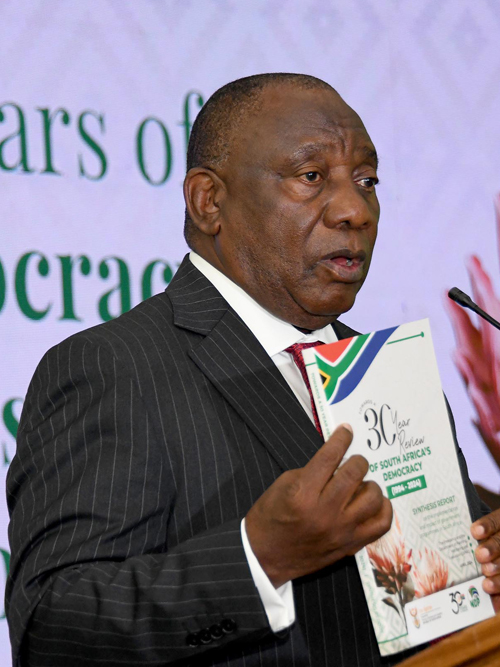Programme Director,
Minister for Planning, Monitoring and Evaluation, Ms Maropene Ramokgopa,
Minister in the Presidency, Ms Khumbudzo Ntshavheni,
Deputy Minister in The Presidency, Ms Pinky Kekana,
Ministers and Deputy Ministers,
Members of Parliament,
Directors-General,
Officials,
Distinguished guests,
Ladies and gentlemen,
Fellow South Africans,
It is a great pleasure to be here at the launch of the 30 Year Review Report on the work we have collectively undertaken to build a democratic, prosperous and free South Africa.
This vision of a free South Africa has inspired and guided the struggle of our people for many decades and for many generations.
It is this vision that lies at the heart of the Freedom Charter, which was adopted at the Congress of the People in Kliptown nearly seven decades ago.
The brave men and women of South Africa pledged in Kliptown to strive together, sparing neither strength nor courage, until the democratic changes set out in the Freedom Charter had been won.
It was on this day, the 8th of May, in 1996, that the Constitutional Assembly adopted our new democratic Constitution.
The Constitution that was adopted on that day gave legal form to the vision contained in the Freedom Charter and continues to guide both the functioning and the direction of our democracy.
While this 30 Year Review is about the journey South Africa has traversed since the advent of democracy, it is also a reflection on progress towards the aspirations of the Freedom Charter and our democratic Constitution.
This Review is undertaken as a tribute to all those who fought for our freedom, and for all South Africans who have worked together to build and enrich our democracy.
The scope of the 30 Year Review Report is not only retrospective. It also looks to the future.
The insights it has generated will inform future Government planning.
It will assist us as we work to achieve the vision of the National Development Plan by 2030 and as we plan for the decades ahead.
The Report will also contribute towards improved policy implementation.
The democratic breakthrough of 1994 represented both a decisive break with a painful past and an opportunity for South Africa to chart a new course.
South Africa is a vastly different place compared to what it was 30 years ago.
Guided by our Constitution and its Bill of Rights, successive democratic administrations have implemented progressive policies and programmes to uplift the material condition of all South Africans, particularly society’s most vulnerable.
These policies have included the provision of basic services, housing, education, health care and social support.
We have established a unitary, democratic state and created institutions to uphold democracy and promote accountability.
We have an independent judiciary, a robust civil society, a free media and a clear separation of powers between the executive, legislative and judicial branches of government.
We have advanced transformative policies to change the racial and gender composition of the economy and the workplace. We have implemented laws to protect workers and advance their rights.
We have restored land to many who had been dispossessed and have provided emerging farmers with the means to productively use their land.
South Africa today is a valued member of the international fellowship of nations. We pursue a progressive foreign policy rooted in advancing the African Agenda, in social justice and solidarity, and in support of multilateralism.
Yet we know that still much more needs to be done.
We are contending with slow economic growth, high unemployment, poverty, inequality and underdevelopment.
We know that for millions of South Africans, the promise of 1994 has not yet translated into the meaningful change that they seek and deserve.
That is why we must, and we will, continue to work in earnest to resolve the challenges that are holding back our progress.
We continue our efforts to overcome the energy crisis, to implement structural reforms to boost economic growth, to drive programmes that create more employment, and to improve the capacity of the state to deliver services.
What is made clear by this Review Report is that the task of consolidating our democratic gains is not just the responsibility of the state. It is a responsibility that we all share.
Just as we stood together to overcome COVID-19, just as we have united to confront other crises, we can overcome this period of difficulty in the life of our nation together.
If we are to fully transform this country, we must renew the same pledge made by our forebears at Kliptown – to strive, sparing neither strength nor courage, until the democratic transformation is complete.
I congratulate the Department of Performance, Monitoring and Evaluation, the various Government departments and all those who have had a role in compiling the 30 Year Review Report.
It has been a substantial undertaking, executed with care and diligence.
The value of this report is that it is backed by solid research and credible, verifiable and accurate data.
It has been said that progress is about enhancing what is and in advancing towards what will be.
Our goal is a better South Africa, a transformed South Africa, a South Africa that leaves no-one behind.
The story of 30 years of democracy contained in this report is an honest and critical appraisal. It presents both light and shade, both progress and challenges.
It is a vital reference for anyone who wants to understand the last 30 years and for everyone who wants to look into our future.
It is our hope and expectation that this Review Report will be studied in detail and that its findings will be applied.
This 30 Year Review Report is much more than a chronicle of a changing nation.
As we chart the path ahead for our democracy, we will look to this Report as a valuable instrument for transformation, progress and growth.
Let us make this a living document that inspires, encourages and guides us as we continue to build a democratic, prosperous and free South Africa.
I thank you.









